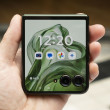Please educate me.
judog2g said:
Why does my cingular phones cause so much interference with other devices (tv, radio, pc, etc.)while I'm on a call? I am f-ing sick of it! I thought this would have been improved with the merger. Is that just a gsm issue? My current Verizon service nor former sprint service has never done this.
Correct! only GSM does this, CDMA doesn't do this. I guess that's another difference between the two. ☹️
I am experiencing the same thing with my ATTWS GSM Nokia 6200 and my mothers GSM Nokia 3595.
It's true.....you do not experience this static with CDMA. When I worked at Verizon Wireless (as well as at ATTWS,) if I had my Nokia 6160 on my desk, I would hear static in my call center headset whenever the phone went into sleep mode or when I received a call or received a text message.
lexical said:
That might be it. I knew I heard something about SIM-free GSM technology. Kinda like sugar-free but without the nasty aftertaste. 😉
🤣
The reason you hear or see those pulsating noise is because that the affected equipment is poorly shielded. The "noise" can get even louder if you have a weak signal (either because you are far from the nearest site or you have other GSM phones transmittin...
(continues)
What's required to shield against RF and EMI is quite different. Phones willl also be quite different in whether they're designed to reduce the EMI generated by the battery; many phones have not been well-designed in this respect.
GSM and TDMA phones will also often cause interference with older hearing aids; someone wearing a hearing aid next to a GSM...
(continues)
captainplooky said:...
The interference from GSM and TDMA is often both radio frequency (RF) and electromagnetic (EMI). An alternating current is induced in the wires of the GSM or TDMA phone due to the alternating draw on the battery and will create EMI if no magnetic cancellation techniques are used inside the phone. CDMA (Code Division Multiple Access) phones are more consistent in their power requirements.
What's required to shield against RF and EMI is quite different. Phones willl also be quite different in whether they're designed to reduce the EMI generated by the battery; many phones have not been well-designed in this respect.
GSM and TDMA phones will also often cause interference with older hearing aids; som
(continues)
captainplooky said:...
The interference from GSM and TDMA is often both radio frequency (RF) and electromagnetic (EMI). An alternating current is induced in the wires of the GSM or TDMA phone due to the alternating draw on the battery and will create EMI if no magnetic cancellation techniques are used inside the phone. CDMA (Code Division Multiple Access) phones are more consistent in their power requirements.
What's required to shield against RF and EMI is quite different. Phones willl also be quite different in whether they're designed to reduce the EMI generated by the battery; many phones have not been well-designed in this respect.
GSM and TDMA phones will also often cause interference with older hearing aids; som
(continues)



